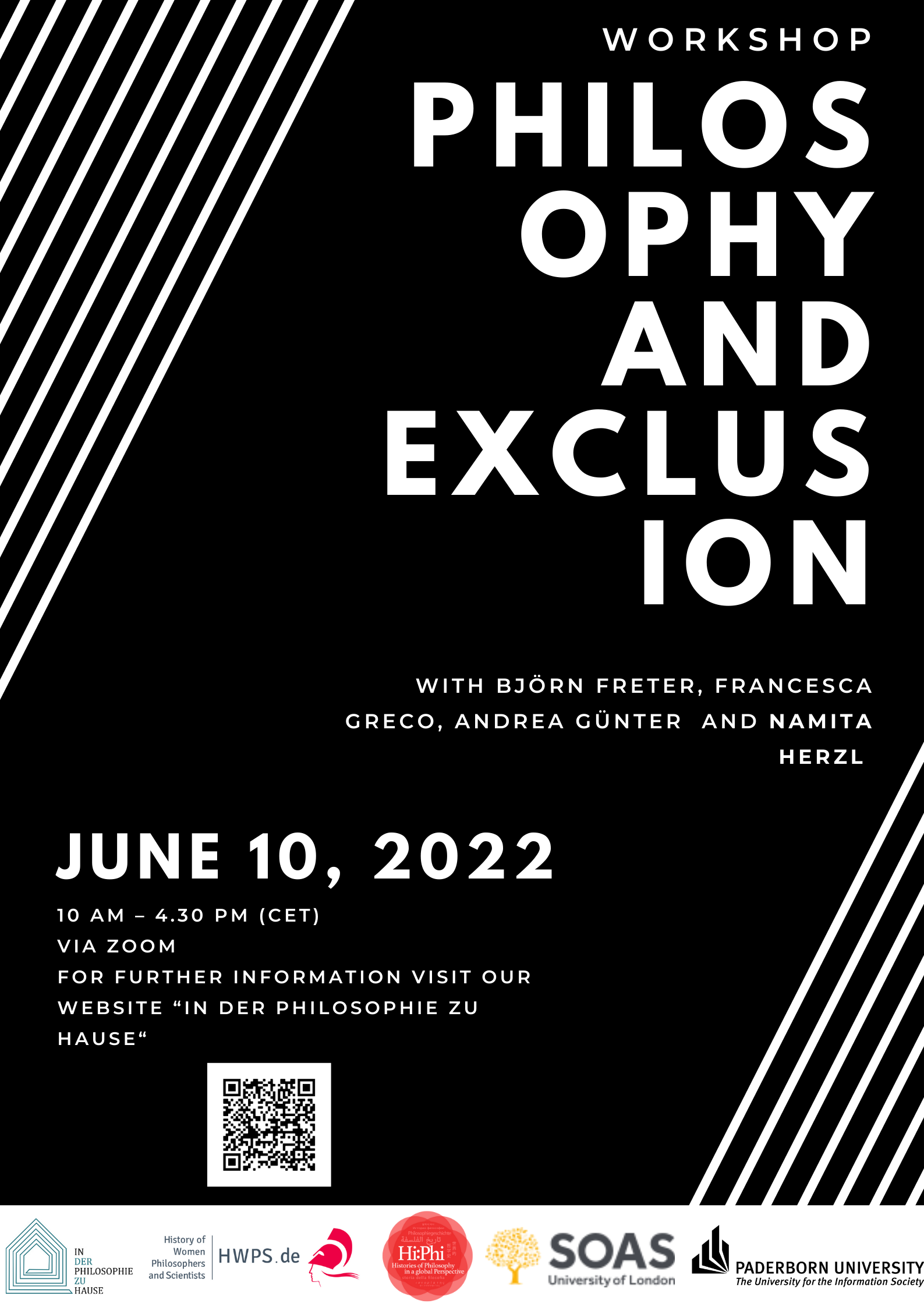
Workshop: Philosophy and Exclusion Teaching Area on Diversity – In der Philosophie zu Hause
Workshop | 10:00 AM - 4:30 PM |
Workshop Philosophy and Exclusion
2022, June 10th at Paderborn University
Via Zoom
Meeting-ID: 964 9762 0520 Code: 303146
Program
10:00- 10:30 Welcome
10:30 – 11:30 Francesca Greco, Some Practices of Exclusions based on the Philosophical Historiography in Italian Language
11:30 – 12:30 Namita Herzl, Philosophical Mechanisms of Marginalisation in a Global Perspective
12:30 – 13:30 Lunch Break
13:30– 14:30 Andrea Günter, Exclusion by Inclusion: The Gender Bias of Philosophical Concepts and the Exclusion of Women in Philosophical Traditions
14:30 – 15:30 Björn Freter, The Cycle of Superiorism. Practices of exclusion in western philosophy
15:30 – 16:30 Final discussion
Online workshop hosted by the Teaching Area on Diversity at the Paderborn Philosophy Department (In der Philosophie zu Hause: www.uni-paderborn.de/in-der-philosophie-zu-hause) and the Center for the History of Women Philosophers and Scientists (https://historyofwomenphilosophers.org/ ).
The workshop is organized by Ana Rodrigues, who is the organizational head of the research area of our Diversity section at the Chair for Practical philosophy. The workshop is co-organized by our Center for the History of Women Philosophers and Scientists, also a division of the Chair for Practical philosophy.
The workshop will be joined by Björn Freter (Lecturer in World Philosophy, The School of Oriental & African Studies SOAS, University of London) and Namita Herzl (Researcher at the Koselleck-Project – Histories of Philosophy in a Global Perspective, University of Hildesheim).
This workshop is also a cooperation with the Arbeitsgruppe ‘Frauen in der Geschichte der Philosophie’, which I am directing on behalf of the Deutsche Gesellschaft für Philosophie. (https://dgphil.de/verbaende-und-ags/arbeitsgemeinschaften/ag-frauen-in-der-geschichte-der-philosophie/ )
Outline of the thematic background of this event:
Philosophy often presents itself as an enterprise in which everyone is invited to participate. On closer inspection, however, it is striking to note that a significant number of people have been and are being excluded by philosophers as unfit for philosophy. If we look at the history of Western philosophy, we soon find that certain human beings have been radically excluded time and time again. Since the eighteenth century, for example, it can be clearly stated that philosophers who were not perceived as male, who were not racialized as white, or who were not ascribed to Western culture, were systematically excluded from philosophy. However, in this very story, we cannot find not a single philosophical argument that could justify this exclusion. This is hardly surprising; it is doubtful that there can be such a philosophical justification. Who should legitimately be able to have this right? And yet it is a factual reality that philosophy is not ruled by all human beings, but only by very specific human beings. This is certainly not because only these particular human beings practice philosophy, but because these particular human beings, knowingly or not, keep alive a tradition of exclusion. In this workshop, we wish to expose this phenomenon from different perspectives be it based on examples, be it through general reflections. We want to promote an exchange on this problematic dimension of philosophy and its history and thus contribute to the ongoing change of the discourse and a renewal of the canon.










 share
share tweet
tweet